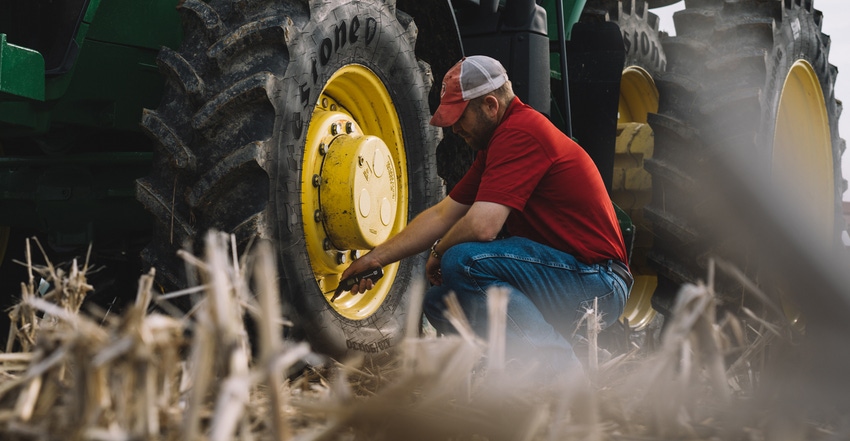
Don’t worry about your equipment tires until you see a low one or have a flat. Then slap on a new tires and forget them, right? If that’s your strategy, experts say you’re leaving performance and dollars behind.
Here are often-asked questions about agricultural tires. Providing answers are Scott Sloan, ag products manager for Titan and Goodyear farm tires, and Brad Harris, manager of global field engineering for Firestone Ag.
What happens if you run on tires that are underinflated?
Harris: It is always important to understand that the inflation pressure in the tire carries the load. Operating tires underinflated will cause the tire to generate more heat and can result in rapid wear, uneven wear patterns or internal separations in the tire. All these conditions will reduce the life of a tire.
Sloan: The internal temperature of the tire will increase, which can break down the internal construction over time and eventually lead to failure. The increased flexing of the tire will also lead to uneven wear on the edges of the tread and sidewall.
What happens if you run on overinflated tires?
Harris: Overinflation will not cause any structural issues like running underinflated. Radial agriculture tires that run overinflated will result in a smaller footprint. The smaller footprint will generate less traction and mean that you need more fuel to complete a task.
Sloan: An overinflated tire will be at increased risk of impact damage in the field and on the road. Bulging will lead to uneven wear toward the center of the tread.
How often should you check tire inflation pressure?
Harris: I recommend checking inflation pressures daily when using the equipment.
Sloan: Maintaining proper inflation pressure is the most important thing you can do to extend the life of your tires. Ideally, check every time you’re about to enter the field or road. But that’s not always realistic. So, at minimum, if a farmer checks, and adjusts inflation if necessary, every time a major change to weight or application is made, that would be the best bet.
How do you prevent road lope?
Sloan: Making sure to adjust inflation pressures for road transport speeds and the weight of anything you’re towing is the best way to avoid road lope. That’s what Low Sidewall Technology tires, exclusive to Titan and Goodyear farm tires, are designed to do. Regardless of inflation pressure, LSW tires will reduce road lope thanks to the increased rim diameter and shorter sidewalls.
What terms describe the types of materials used to make tires and types of tire construction?
Sloan: A tire is made up of several components, including a bead bundle, body plies, belts and tread. The bead bundle is a group of high-strength steel wires that provides anchor to the rim. Body plies, made from fabric that extends from bead to bead, form the casing. Belts, made from rubber-coated nylon or steel, add strength to the tire and stability to the treads on the outside of the tire.
Selection of every component is based on desired performance, including load-carrying capacity, speed rating, cut and wear resistance, traction, and flotation.
Many different rubber compounds are used. The compound for the tread is usually very different from the compounds used around the bead and around sidewalls and body plies.
About the Author(s)
You May Also Like




